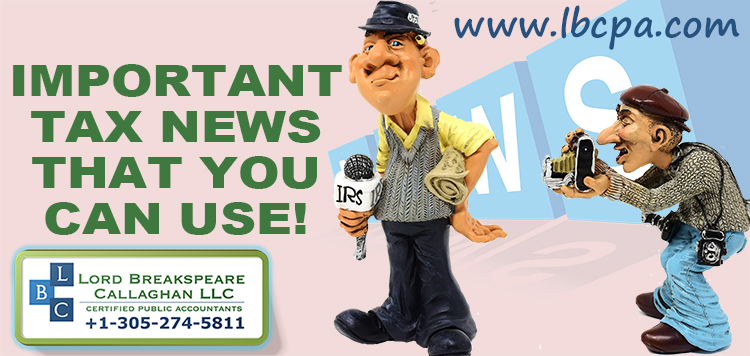LBCPA News 
Click here to go back
FOLLOW THESE TIPS TO HELP PREVENT COMMON ISSUES AND AVOID REFUND DELAYS

Ready to file your tax return? Stop and check out these tax tips below before you file to avoid tax errors and pass “go” with confidence.
Use your year-end income statements (e.g., Forms W-2/1099) to verify your income. Your income figures must match what is reported on year-end statements. Always use the information reported on any year-end income statements, such as Form W-2 or Form 1099, Schedule K-1, virtual currency statements, etc.).
In case you didn’t know, the IRS’s computer systems compare the income that you report on your tax return to what has been reported to them by payers. When income and/or federal income tax withholding don’t match, this will cause a delay in the processing of the return and any refund until the discrepancy is resolved.
Year-end statements can include corrections or bonuses and therefore wouldn’t match, for example, your last pay stub figures.
Review all forms for accuracy before filing. If you find any discrepancies, contact the payer immediately and request the payer issue a corrected statement as soon as possible.
Double check that your information is correct for yourself and your dependents. Check name spellings, taxpayer identification numbers, dates of birth, addresses, and your bank account information for accuracy. Be aware that you must have valid Social Security numbers for all your dependents before filing or that may not only delay processing of your tax return, but in certain instances disqualify you for some refundable credits, like the Earned Income Tax Credit.
Check for all credits and deductions for which you may be eligible. Review the tax form instructions to ensure you claim all the deductible items and credits for which you are eligible. You can also see the IRS’s Credits and Deductions pages. Complete any worksheets, schedules, or forms to support those items.
A lot of the eligibility requirements for these items often change yearly, and the forms and formulas used to calculate them can be complex to complete.
Generally, family-related credits and deductions are the areas that have the most errors and one of the main reasons (after income/wage mismatches we just mentioned) that cause return processing slow-downs.
So, follow the instructions carefully, double check your entry information and always re-check your math.
Don’t forget your W-2s, 1099s, and other required attachments. This includes Form 8962 if you are claiming the Premium Tax Credit and Form 1099-G if you received unemployment benefits. Any income document that shows federal income tax was withheld must be attached to your return, if you are filing by paper.
If you are filing electronically, follow the software provider’s instructions.
If you are unable to obtain your W-2 (or other information returns like Form 1099, Schedule K-1, etc.) from payers because they closed, you can call the IRS for assistance at 1-800-829-1040, but you must wait until after February 1.
If you received unemployment benefits in 2021, you will get a Form 1099-G, Certain Government Payments, from the agency paying the benefits. The agency will either automatically send a paper copy or, if the agency does not mail the form, recipients will need to visit the agency’s website to get an electronic version of the form. The agency usually provides a paper copy by January 31.
If you received a federal tax refund in 2021, you may have been paid interest. Refund interest payments are taxable and must be reported on federal income tax returns. See the Form 1040 Instructions for more details. In January 2022, the IRS will send Form 1099-INT to anyone who received interest totaling $10 or more.
If you received Economic Impact Payments in 2021, you will have to calculate whether you received the full amount for which you are eligible. If you did not receive the full amount to which you are entitled you should follow the tax return instructions on how to claim this on your tax return.
If you received Advance Child Tax Credit payments in 2021, you will need to reconcile these payments against the total credit for which you are eligible on your 2021 individual tax return. The advance payments you are receiving during 2021 cover only half of the total credit, so you will claim the remaining portion on the 2021 tax return.
Use Letter 6419 that the IRS sent to you in January 2022, to provide the total amount of advance Child Tax Credit payments that were disbursed to you and follow the tax return’s instructions carefully.
If you received any of these payments in error, you also have to report that information on the tax return.
Use E-file, and either Direct Deposit or Direct Pay too. We recommend electronically filing your tax return – it’s faster, more accurate and secure. If you’ve been hesitant in the past to switch over from paper, now’s the time to make the move!
If you are using the same software as the prior year, you’ll want to check that only the current year information is present, and that prior year data didn’t transfer over which may cause an error.
Always double check your figures before hitting submit.
If you have any questions regarding Essential Business Accounting, Domestic Taxation, International Taxation, IRS Representation, U.S. Tax Implications of Real Estate Transactions or Financial Statements, please give us a call at 305-274-5811.
Source: TAS






